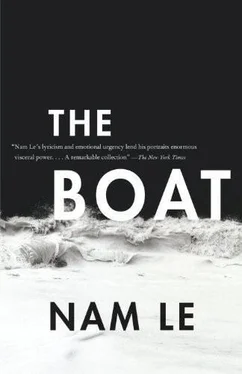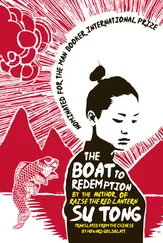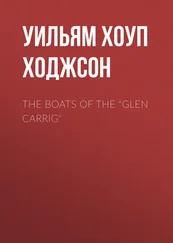When the others were not around, Hernado talked differently to me. Sometimes he liked to watch people going about their business, particularly in crowded places, at times when we were supposed to be doing recon. Once, in a plaza at noontime, he pointed to a farmer at a market stall, then a man at a construction site, and asked if I thought they were happy.
I don't know.
What about them?
I looked where he pointed.
They are probably happier, I said, half jokingly.
Pah ! He spat on the parched grass. The suits, they are richer, yes. He turned back to the construction worker, lean and black-skinned and slow-moving in the heat. He thought for a moment, frowning all the while, then said, But to work with your hands, and to work with others — that is real work. He spat on the ground again. He had told me once that his father was a farmer in the west country — it was after I had told him about my own father, the details of his unforeseen death — but since then, the past had never been discussed between us.
It may not make a man happy, he said, but at least there is honor in it.
In that way, too, he was different. While most of the gallada was concerned with buying the new things, Hernando talked to me during those three years about happiness and honor — even about politics — about a future unconnected to money.
Then the day came, seven months ago, when we became brothers. We were all playing football in a park on the edge of the city. Hernando was one of the better players and looked like a bronze statue in motion. Someone kicked the ball off the field. It went a long way, then stopped at the leg of a man sitting on a stationary motorcycle. The man got off his bike, removed his sunglasses, and kicked the ball — in the opposite direction — into the traffic away from the park.
Hernando had been chasing the ball. I had followed him because I wanted to speak in secret about a new strategy for the game.
What are you doing? Hernando called out to the man.
Hey, puto ! the man said. Why aren't you working? Life isn't a bowl of cherries.
You should not have kicked our ball away, said Hernando.
I am doing you a favor. The man paused briefly, then swiveled to look over his shoulder. At that moment I realized he was there with another man, a uniformed policeman, also sitting on a motorbike.
Come here, the policeman said to Hernando. He was smiling. The first man began to smile too.
Hernando walked over without hesitating. He was wearing only pants and his sweating body looked large and powerful next to the shape of the sitting policeman. I watched and said nothing.
You would argue with a business leader in our community? the policeman said cheerfully. He undipped his holster. Hernando did not move. Turn around, the policeman said. You will argue at the station.
I watched as the policeman handcuffed Hernando. Then I felt my arms being jerked behind my back — the other man had approached silently — and I felt the cold click of metal around my wrists. This man led me to his motorbike and sat me down behind him, facing backward, away from him. He smelled of alcohol.
As the motorbike started moving, I slouched into the man's back to keep my balance. I saw the park diminishing — everyone had vanished from the football game — but I could not see where we were going.
Hernando's bike was in front of ours so I could not see him either. The handcuffs cut into my wrists. Soon I realized we were going away from downtown Medelhn. We were not going to any police station. We began to climb a hill leading us west, higher and higher, into steep slumland. Fear surged through my body: I twisted around, trying to locate Hernando, but the man growled and elbowed me on the side of my head. A voice sang out. We skidded onto a dirt road. The back tire kicked dust into my face and I coughed, my eyes still smarting. When the dust cleared I made out scrapwood shacks, a series of clothes lines, two women glancing up then down from a cooking fire — the power cables didn't run this high — then suddenly, as we swerved again, the city — far below — the vast concrete valley sealed in by a film of smog as flat and blue as a lake.
We turned away onto a narrow track. My breath now coming hot, fast. I could feel the man's sweat on the skin of my back, soaking through my shirt. Sunlight flared from corrugated tin roofs and plastic sheeting on the hillside below us. The ground grew thicker with olive-colored shrubs and banana trees.
The man said something but I could not hear it in the wind. At that moment I realized there were no more houses anywhere in sight. The motorbike slowed.
Jump! someone yelled. It was Hernando. Automatically I leaned to the side of the bike. I tried to jump but my pants got caught in the chain. Then the bike pitched onto its right side and I began to roll down the grassy hill, my hands cuffed behind me. I heard a couple of gunshots. I kept rolling until the ground leveled off. My head felt like it had been stabbed at the back. Moments later I felt someone's boots roll me onto my stomach. I waited for the shot. All I could smell was earth, and grass, and it smelled richer than I had ever smelled anything before. I waited. But the gunshot did not come, and then I felt someone unlock and remove my handcuffs. Hernando helped me to my feet. Blood leaked from his right armpit. He led me up the hill to where my captor, the businessman, lay under the bike, one leg bent so far back the wrong way the foot almost touched the hip. Hernando handed me a gun.
It is his, he said.
And the policeman? I asked.
Your corrupted friend is dead, Hernando said sternly to the man, as though it were he who had asked the question.
The man groaned. The flesh around his mouth had gone loose. I did not know then — as I do now — that this was a sign of fear.
You must do this, said Hernando. He looked at me like a brother. He said, Ron, you must do this so we are in it together.
I took the gun, which felt unexpectedly warm and heavy in my hand, and which gave off a smell like a match being lit in a dark room. I pointed it at the man's head. His sunglasses were broken and bent around his ear and the fragments shone in the afternoon light. I aimed at the blackness in the middle of his ear and shot.
After a while, I turned my back to the man's face and tried to lift the motorbike from his broken lower body. I felt filled with a tremendous lightness, as if every breath I took was expanding inside me. Then I remembered something.
The policeman. How did you –
Hernando let out a short, burp-sounding laugh. He bent his knees as though about to sit down on an invisible chair, then tipped onto his ass. He seemed suddenly drunk.
The stupid puto stopped, he said, because the handcuffs were uncomfortable against his back. But he would not turn me around to face the same way as him — he said he did not want a faggot rubbing up behind him. Hernando burped again. So he handcuffed my hands in front. At the top of the hill, I stopped him like this.
Hernando tilted his head backward and lifted his arms up, high up, arching them over his head. I saw the gashes in his right armpit that the policeman's fingernails must have made when the cuffs looped over his face and under his throat.
I watched him and he laughed again. Inside, the light air filled me like sacol. Help me lift this, I said. But he did not look at the bike. He remained sitting on the grass, half naked, embracing his legs tightly.
For me too, he said. That was my first time too. He frowned, looking straight ahead. His face was as white as a plastic bag. Then a change came over it as though he was going to be sick. Then his face changed again and he smiled, but now the smile only affected his mouth.
Читать дальше











